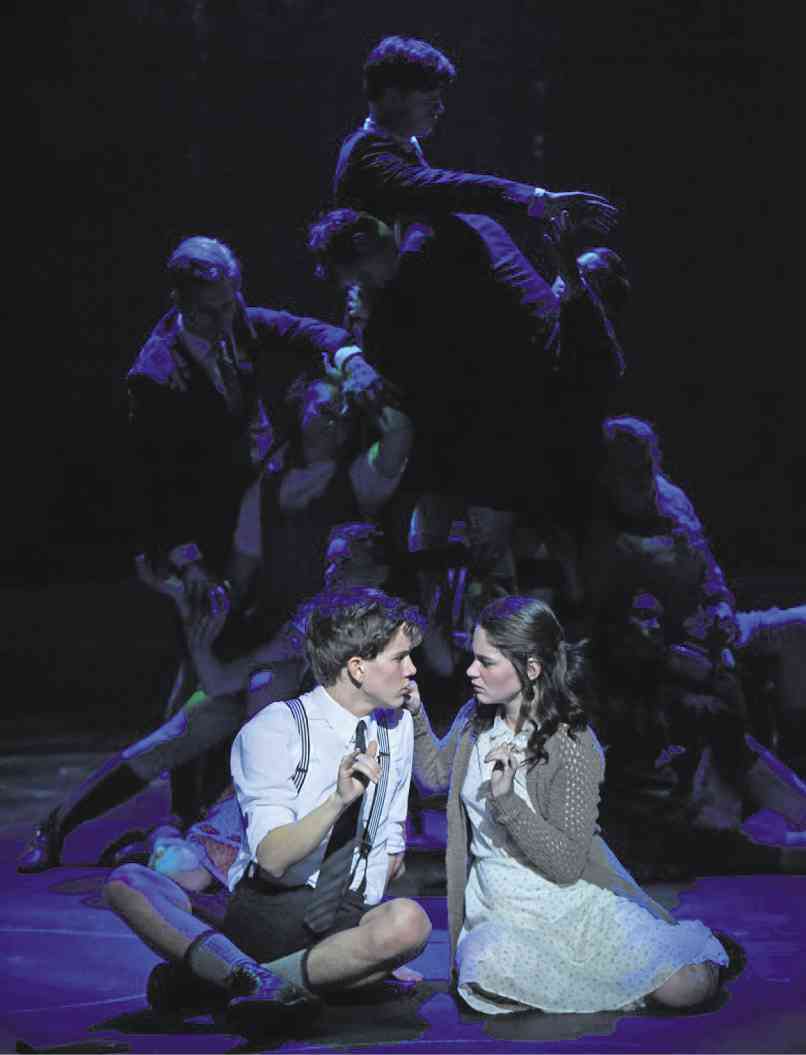
AUSTIN McKenzie is wonderful, while Sandra Mae Frank is luminous in Deaf West’s “Spring Awakening.” Photo by Kevin Parry/www.springawakeningthemusical.com
NEW YORK—More often than not, we will watch theater for one reason: to be entertained. There are the big, bombastic musicals on Broadway that feature great singing and wonderful dancing, and those in the audience are immediately impressed. However, amid the flash and panache, there is one show currently running that is uplifting and inspiring not only because it has great singing and inventive choreography, but also because of who its actors are. I speak of Deaf West’s “Spring Awakening.”
The original run of “Spring Awakening” (the Eugene O’Neill Theater was its home) ran on Broadway for just over two years, opening on Dec. 10, 2006 and closing on Jan. 18, 2009. It starred Jonathan Groff, Lea Michele, John Gallagher Jr. (who won a Tony Award for best featured actor in a musical) and Skylar Astin.
This revival (with book and lyrics by Steven Sater, music by Duncan Sheik, choreography by Spencer Liff and direction by Michael Arden), which debuted in Los Angeles, is on Broadway at the Brooks Atkinson until Jan. 24, 2016.
Banned in 1891
The musical was based on a Frank Wedekind play, originally published in 1891. Because of its subject matter and very explicit adult themes, the play was banned, receiving its first staging at London’s National Theatre in 1974, to good notices. Arden, for this production, added yet another layer: the banning of the teaching of sign language in favor of “oralism” (lip-reading, copying mouth shapes), which occurred in the 1800s.
For this production (whose cast, save for one actor, does not employ the use of stick microphones for the songs as in the original production), the characters of Wendla (luminously played by Sandra Mae Frank, with her voice played by Katie Boeck who also often plays guitar) and Moritz (a riveting Daniel N. Durant, voiced by Alex Boniello, the only performer to use a stick mic whenever he sang) are deaf, and acted by deaf actors.
Signed dialogue
Melchior is played by a hearing actor (the wonderful Austin P. McKenzie), who signs all his dialogue and music. Playing the adult figures are Oscar winner Marlee Matlin, Camryn Manheim, Patrick Page and Russell Harvard. And whenever the characters aren’t speaking (as in one scene between Moritz and his father), all the signed dialogue is translated with projections, like chalk writing on a blackboard. The result is pin-drop silence, and complete focus on everything happening on stage.
All the young actors and orchestra members are stunningly beautiful, be they deaf, hearing or nonambulatory (one actor, “The Glee Project’s” Ali Stroker, is in a wheelchair). Their portrayals are expressive and transporting, as well as very real and honest. There are scenes that show sex … masturbation … abortion … ignorance … suicide … adolescent rebellion … incest … abuse … pregnancy … homosexuality (now you know why the original source material was banned in 1891).
It is told from the point of view of the young people who are, for the most part, front and center, with the adults seen as stifling, controlling forces. It is due to the adults that two out of the three main characters don’t survive to the end (spoiler alert: Moritz commits suicide because of his father’s expressed disappointment, and Wendla dies from a botched abortion forced upon her by her mother).
Matlin gives a lilting and lovely performance as the adults she gets to play, notably Melchior’s mother, Frau Gabor. Manheim, who also has to voice Matlin’s characters, was one of my favorites—her characterizations are so different from one another in color, tone and energy. Page and Harvard, be they separate or in tandem, possessed gravitas and humor in equal parts, depending on which adult they each had to play.
As for the young people, oh … oh they all were so beautiful, flawed, conflicted, ethereal, on that threshold between childhood and adulthood, that very delicate, strange and fragile time when they are painstakingly trying to figure everything out about life, sometimes succeeding (as in the case of Hanschel, played by Andy Mientus), or miserably failing (see Wendla, who is a victim of her own ignorance as perpetuated by her mother, as well as the abortionist). Everyone’s performances, signed or sung, were so stunning to watch—his or her expressions so vivid and present.
If you happen to be in New York City before Jan. 24, I would urge you to head to Brooks Atkinson Theater to see this incredible production. To everyone involved, congratulations on this unique, sublime piece of theater.